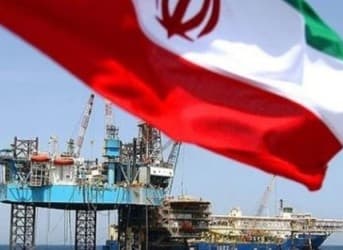Tehran this week said that if its "positive diplomacy" wasn't reciprocated by the Kuwaiti government, it would work to develop its section of a shared oil field alone. Tehran, OPEC's No. 3, said oil production from shared oil fields was on the rise. The Islamic republic, facing isolation in the international community, is unlikely to broker any grand oil deal with Kuwait given arch-foe Riyadh's interest in the region, however.
Iranian authorities announced they were eager to cooperate with the "the brother, Muslim and neighboring country of Kuwait" on the Arash/Dorra oil field in the Persian Gulf. The field holds an estimated 310 million barrels of oil and Tehran said production at the shared fields has increased about 10 percent compared with the last calendar year. Tehran said, however, that if Kuwait wasn't amenable to its diplomatic outreach, it would carry out work at the oil field "unilaterally."
Dorra, as the Kuwait side of the oil field is called, is governed by the terms of a joint venture between Kuwaiti and Saudi oil companies, however. Both sides are moving closer to the preliminary steps needed to develop the field. Iran and Kuwait, for their part, can't seem to agree on a maritime border and while Tehran may, on paper, consider Kuwait to be its "brother," nothing could be further from the case with its relationship with Riyadh.
In 2009, long before the Arab Spring, Iran was accused of providing military assistance to Houthi rebels, a Shiite opposition group in Yemen. Conflict in northern Yemen had threatened to spill over across the Saudi border shortly thereafter, suggesting a proxy war was on the horizon. Nearly three years later, Riyadh tried to pin the blame for unrest in its oil-rich Eastern Province on the Iranians.
Now, apart from a steady series of military drills in and around the Persian Gulf, Tehran appears to be using oil and natural gas as a tool to gain political capital in the region. Pakistan has already bucked U.S. sanctions through its support for a natural gas pipeline from Iran. Survival is proportional to power and Iran may be working on the margins of its diplomatic circle in an effort to sustain any sort of regional dominance. Islamabad is already frustrated with its U.S. partnership in part because of counter-terrorism operations in the region. But Kuwait is a largely Sunni state that counts the United States as an ally. Last year, the kingdom traded jabs with Tehran over an alleged spy ring so it's doubtful that energy will heal any wounds. While Iranian crude oil continues to flow in the world market, the Islamic republic likely faces growing isolation in the Arab world's energy sector.
By. Daniel J. Graeber of Oilprice.com


















